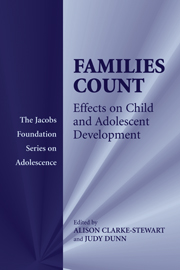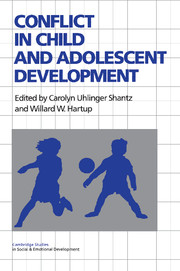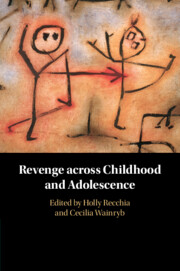Families Count
This book is concerned with the question of how families matter in young people's development - a question of obvious interest and importance to a wide range of readers, which has serious policy implication. A series of key current topics concerning families are examined by the top international scholars in the field, including the key risks affecting children, individual differences in their resilience, links between families and peers, the connections between parental work and children's family lives, the impact of childcare, divorce, and parental separation, grandparents, and new family forms such as lesbian and surrogate mother families. The latest research findings are brought together with discussion of policy issues raised.
- The latest research findings on the key issues concerning the impact of families on children and young people are clearly set out and discussed
- The book brings together the top researchers
- Issues discussed have a wide appeal and are important to everyone
Reviews & endorsements
"...the breadth and clarity of its coverage is unique and edifying. ...with its incisive analyses and abundant references, Families Count is a must-have reference for all who are concerned with the factors in children's development. It would also be an excellent starting point for graduate, or upper division undergraduate, seminars in psychology or sociology courses concerned with children, families, or both. Certainly, the contents would provide an overview and multiple ideas for further investigations. Finally, the volume should be required reading for all those in academic considerations of public policy affecting children and families, as well as all those involved in the pragmatic development and implication of such policies."
--Contemporary Psychology: APA Review of Books
"The first essay will be an excellent resource for courses on child development: it provides and excellent, readily understood orientation to the various models of influence, and it is an essential guide to the other essays. The last three chapters offer a satisfying wrap-up to the valuable research in this densely packed volume."
--Choice
Product details
March 2006Paperback
9780521612296
400 pages
229 × 153 × 22 mm
0.523kg
4 tables
Available
Table of Contents
- Introduction
- Part I. Risk and Resilience:
- 1. How families matter in child development: reflections from research on risk and resilience Ann S. Masten and Anne Shaffer
- 2. The promotion of resilience in the face of adversity Michael Rutter
- 3. Identifying risk and protective factors for healthy child development Arnold Sameroff
- Part II. Peer and Parents:
- 4. The influence of family and peer relationships in the development of competence during adolescence W. Andrew Collins and Glenn I. Roisman
- 5. Toward a dynamic developmental model of the role of parents and peers in early onset substance use Kenneth A. Dodge, Patrick S. Malone, Jennifer E. Lansford, Shari Miller-Johnson, Gregory S. Pettit and John E. Bates
- Part III. Work and Family:
- 6. Mothers and fathers at work: implications for families and children Ann C. Crouter
- 7. The family-child care mesosystem Kathleen McCartney
- Part IV. Discord and Divorce:
- 8. Marital discord, divorce, and children's well-being: results from a 20-year longitudinal study of two generations Paul R. Amato
- 9. The influence of conflict, marital problem solving and parenting on children's adjustment in nondivorced, divorced, and remarried families E. Mavis Hetherington
- 10. Adolescents' development in high-conflict and separated families: evidence from a German longitudinal study Sabine Walper and Katharina Beckh
- Part V. New and Extended Family Forms:
- 11. New family forms Susan Golombok
- 12. Grandparents, grandchildren, and family change in contemporary Britain Judy Dunn, Emma Fergusson and Barbara Maughan
- Part VI. Conclusions and Commentaries:
- 13. What have we learned: proof that families matter, prospects for future research, and policies for families and children Alison Clarke-Stewart
- 14. Research and policy: second looks at views of development, families, and communities and at translations into practice Jacqueline J. Goodnow
- 15. Prognosis: policy and process Robert A. Hinde.








